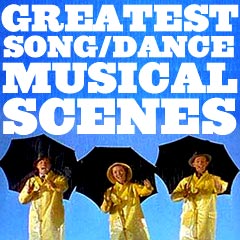
|
|
| D (continued) | |||||||||||
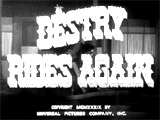
|
As a lusty, tawdry, frontier saloon singer and hostess/bad girl named Frenchy, Marlene Dietrich sang the rousing Western number Little Joe the Wrangler (pictured) with a whiskey, monotoned, deep-throated voice - a ribald elegy for an unlucky cowboy while surrounded by other oaters on the saloon floor. She also sang You've Got That Look (That Leaves Me Weak) (pictured) while wearing a feather boa:
Frenchy also excited her western audience with a rendition of See What the Boys in the Backroom Will Have (pictured) - she wore a black cowgirl/bolero outfit on stage, and first asked her audience: "Anybody thirsty?" - and then placed her leg up on a chair and began belting out the saloon song. In the midst of the song, she kicked another saloon-girl tart in the hind-end in the audience who had taken attention away from her, and sat in the lap of a cowboy. And during the finale of the song, she strutted down the length of the bar and to emphasize one line of the lyrics, she made her throat quiver by grasping the flap of skin below her chin and jiggling it. |
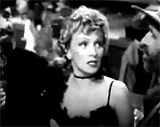 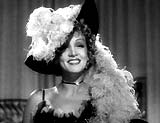  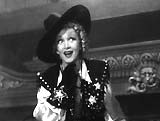
|
|||||||||

|
Dick Tracy (1990)
Actor/director Warren Beatty's visually-stunning big-budget action film, with a musical score by Stephen Sondheim, was based on the comic-strip detective. It starred pop singing star Madonna as seductive nightclub singer Breathless Mahoney in Club Ritz. The film had seven nominations and won in three categories: Best Makeup, Best Art Direction, and Best Original Song. She was featured with three torchy songs:
|
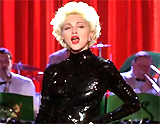 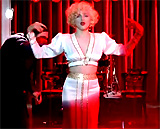 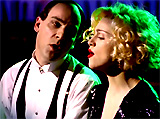
|
|||||||||
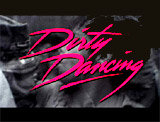
|
Dirty Dancing (1987)
This box-office sleeper romantic drama hit (by director Emile Ardolino) about coming-of-age showed repressed, sweaty, off-limits scenes of early 1960s 'dirty dancing' among the staff at a Catskill Mountains summer resort hotel known as Kellerman's, with its macho resident dance instructor and sexy suitor Johnny Castle (Patrick Swayze), who progressively taught 17 year-old Frances 'Baby' Houseman (Jennifer Grey) expressive R 'n' B and mambo dance moves. In his red-lit bungalow, she invited the shirtless Johnny to symbolically "Dance with me." Incredulous, Johnny asked: "What, here?" and she replied boldly: "Here." She sensuously put her arms around his shoulder and dipped backwards, coming close to almost kissing him, as they danced to Solomon Burke's Cry to Me (pictured). He helped her to remove her blouse from the bottom up, exposing her white bra and jeans as he caressed and kissed her when she came close to his lips. In the climactic stage revue show at the end of the season, Johnny (who had been wrongly fired from the resort) returned and confronted 'Baby's' parents (mostly her protective father Dr. Jake Houseman (Jerry Orbach)) as he led her to the dance floor ("Nobody puts Baby in a corner!") and put on a spectacular show in the film's finale.
He lifted her above his head in an iconic pose to the tune of the Oscar-winning (I've Had) The Time of My Life (pictured) - the film's theme song (music by John DeNicola, Donald Markowitz and Franke Previte, lyrics by Franke Previte), performed in the film by Bill Medley and Jennifer Warnes. The song also won the Golden Globe Award for Best Original Song, and the Grammy Award for Best Pop Performance by a duo. |
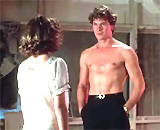 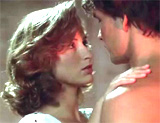 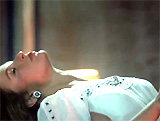 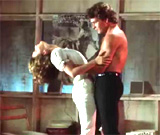 Baby's Request to Have a Sensuous Dance With Johnny: "Dance with me" 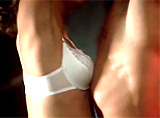 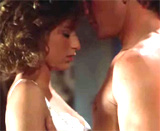 The Subsequent "Dance With Me" Scene - Stripped Down to White Bra |
|||||||||
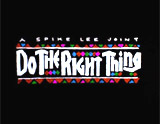
|
Do the Right Thing (1989)
This was the third (and breakout) feature film for African-American writer/director Spike Lee (who also starred as the pizzeria's delivery boy Mookie). It was an even-handed, complex, unapologetic and disturbing social protest work about racism, racial pride, class struggle, intolerance, oppression and violence (based on real-life events). This controversial thought-provoking film provided a raw portrait of explosive conflict and relations between Italian- and African-Americans, Koreans and white law-enforcement in a multi-ethnic Bedford-Stuyvesant neighborhood block (in Brooklyn) during a stifling hot summer day. During the opening credits, hip-hop group Public Enemy performed the film's hard-edged anthem and title rap song, Fight the Power (pictured twice) as one of the characters, Tina (Rosie Perez) danced in front of apartment steps (in a reddish hue).
It was also played at the start of a confrontation, when Radio Raheem (Bill Nunn) was blasting Public Enemy's rap song Fight The Power (pictured) on his massive boom box inside a pizzeria, with Buggin' Out (Giancarlo Esposito) next to him. When Italian-American Sal (Oscar-nominated Danny Aiello), the white operator of the pizzeria, destroyed Radio Raheem's stereo (playing "jungle music") with a baseball bat when he wouldn't turn down the volume, a fight broke out. |
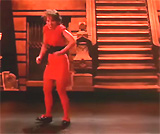 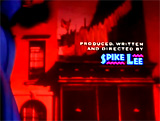  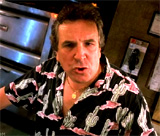 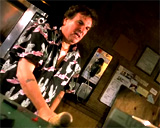
|
|||||||||
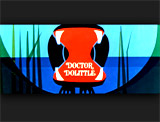
|
Doctor Dolittle (1967)
This Best Picture-nominated Fox film musical adaptation of a favorite children's story by director Richard Fleischer was considered overproduced and flat, although its star was acclaimed Rex Harrison as the title character animal veterinarian, Dr. John Dolittle. [Note: the film was remade with the starring role going to Eddie Murphy, in director Betty Thomas' comedy-fantasy Dr. Dolittle (1998).] The film received nine Academy Award nominations (including Best Picture, Best Musical Score, and Best Musical Score Adaptation), and won only two Oscars: Best Special Effects, and Best Original Song. Doctor Dolittle spoke in many animal tongues, and sang the Oscar-winning song (If You Could) Talk to the Animals (pictured twice), composed by Britisher Leslie Bricusse. It was a scene in which he first spoke to his intelligent parrot Polly, and then went outside and spoke to other species. The title character also argued in a talk-song that animals should not be treated like animals, in Like Animals (pictured):
He also was featured in the ridiculously romantic ode When I Look In Your Eyes (pictured) sung to a female seal dressed in a bonnet. |
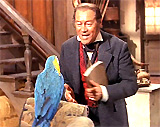 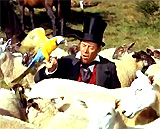 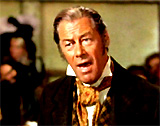 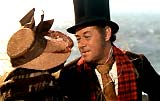
|
|||||||||

|
The Doors (1991) Director Oliver Stone's documentary-style biopic included Val Kilmer's uncanny portrayal of 1960s Doors frontman lead singer Jim Morrison, including his own singing on stage as the rock great. The main scene was Morrison's appearance on TV's the Ed Sullivan Show, when he refused to self-censor words in his performance of Light My Fire (pictured) - he mocked the camera with a huge grin and stressed the forbidden word "higher." |
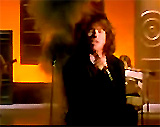 
|
|||||||||
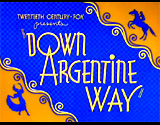
|
Down Argentine Way (1940) Fox's 'peaches-and-cream' Betty Grable (as vacationing American heiress Glenda Crawford in South America) had a star-making role opposite Don Ameche (as Ricardo Quintana) in this enjoyable and garish "south-of-the-border" musical - the studio's first 'exotic' Technicolored musical. It featured Carmen Miranda's (aka the "Brazilian Bombshell") American debut (pictured) - she appeared in a few of the film's nightclub scenes. After being sung to on the piano by Ricardo, Grable sang (in a light blue top) and danced to the Oscar-nominated Best Original song Down Argentina Way (pictured):
|
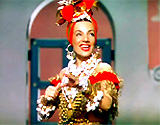 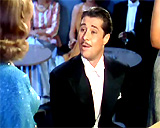 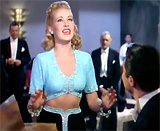
|
|||||||||
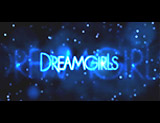
|
Dreamgirls (2006) In Bill Condon's lavish adaptation of Michael Bennett's Broadway musical, the highlight song was performed by spurned lead-turned-backup singer Effie Melody White (Jennifer Hudson) - the show-stopper And I Am Telling You (I'm Not Going) (pictured). It was preceded by the group's breakup song It's All Over (pictured). Other major songs included girl group The Dreams' signature song Dreamgirls ("We're your dream girls"), Family, and Deena Jones' (Beyonce Knowles) Listen (pictured). Also, the cabaret torch song One Night Only by solo-ing Effie, which was stolen by The Dreams' manager Curtis Taylor, Jr. (Jamie Foxx) and turned into an opulent disco hit, One Night Only (pictured) by Diana Ross-like backup-turned-lead singer Deena at Studio 54. There were three other memorable songs by James 'Thunder' Early (Eddie Murphy):
|
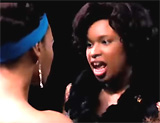 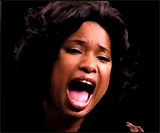 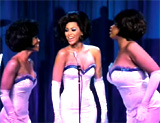 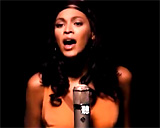 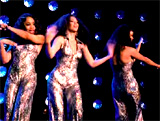 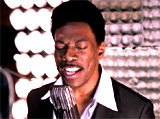
|
|||||||||

|
The Duke is Tops (1938) This vintage, low-budget, independent film made specifically for black audiences was completed in less than two weeks in the late 30s. Although the film was little seen at the time of its initial release, it was re-released as The Bronze Venus (1944) with Lena Horne's name above the title, after her cross-over success in Cabin in the Sky (1943) and Stormy Weather (1943). It featured 21 year-old Lena Horne's screen debut as singer Ethel Andrews (billed as 'The Bronze Nightingale'). The highlight number of the film was Horne's I Know You Remember (pictured). |
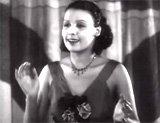
|
|||||||||
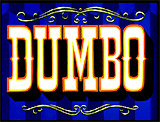
|
Dumbo (1941) There were many memorable songs in this Disney animation, that won the Oscar for Best Musical Score (by Frank Churchill and Oliver Wallace), including:
|
 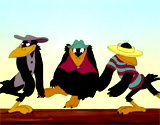 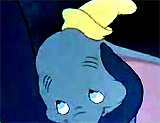
|
|||||||||
(alphabetical by film title) Introduction | A-1 | A-2 | B-1 | B-2 | B-3 | C-1 | C-2 | D-1 | D-2 | E | F-1 | F-2 | G-1 | G-2 H-1 | H-2 | I-J | K | L-1 | L-2 | M-1 | M-2 | N-O | P-1 | P-2 | R-1 | R-2 | S-1 | S-2 | S-3 | T | U-V | W | X-Z |